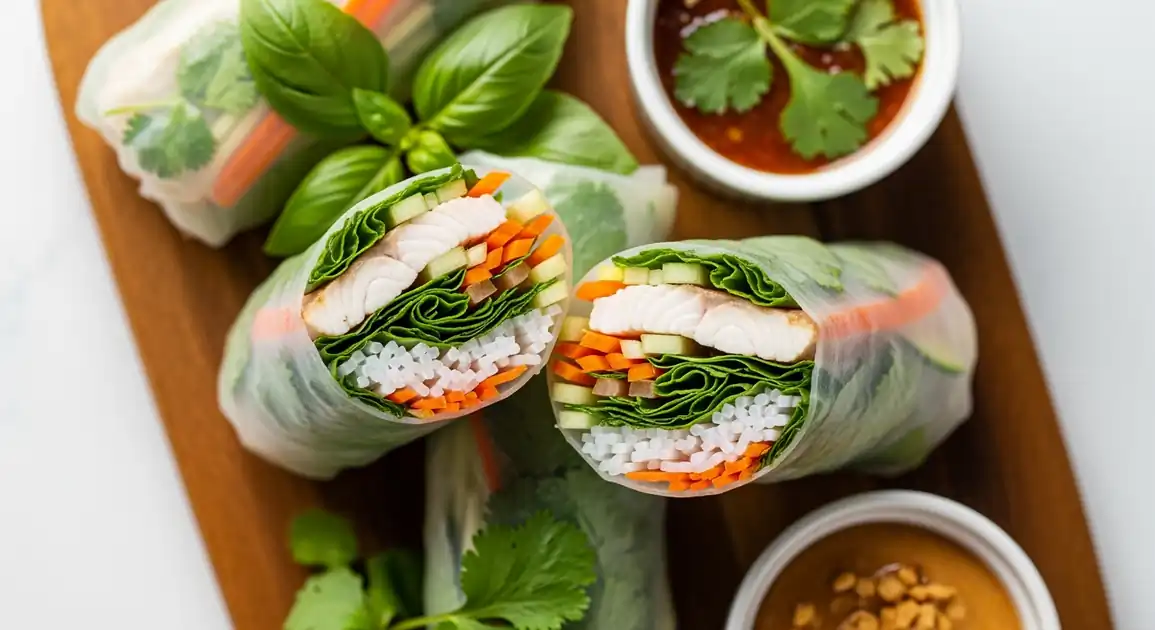Barramundi Rice Paper Rolls
Barramundi Rice Paper Rolls

Description
Across Australia, Barramundi Rice Paper Rolls represent the successful fusion of Southeast Asian techniques with premium local seafood. This dish showcases Australia's multiculturalism and the integration of Asian flavors into modern Australian cuisine. Found in restaurants, cafes, and markets nationwide, these rolls particularly thrive in coastal regions where fresh seafood is abundant and in metropolitan areas with vibrant food scenes.
Dietary Information
Serving information
Serving style
Typically served on a plate or board, accompanied by one or more dipping sauces in small bowls. Usually served cool or at room temperature, never hot. Commonly served as an appetizer or light meal.
Quick facts
Most common during lunch hours (11 AM - 2 PM) and early dinner (5 PM - 7 PM). Markets typically operate morning to early afternoon (8 AM - 2 PM).
Safety Tips
What to Look For
-
Rolls made to order or with high turnover
Freshly made rolls ensure quality and minimize food safety risks. When rolls are made to order or sell quickly, ingredients haven't been sitting out long.
-
Properly stored ingredients
Vendors should keep barramundi and other perishables refrigerated until use. Look for clean, organized preparation areas with proper temperature control.
-
Clean, translucent rice paper without tears or dryness
Quality rice paper that's properly hydrated indicates good preparation standards and freshness.
-
Bright, crisp vegetables and vibrant herbs
Fresh components are not only more flavorful but indicate proper food handling and storage.
-
Properly cooked barramundi with consistent color
Fish should look moist and properly cooked through, with no translucent or raw sections. The color should be consistent without dark or discolored areas.
What to avoid
-
Pre-made rolls that look dry or soggy
Rolls that have been sitting too long develop texture issues - either dried out wrappers or soggy, disintegrating ones.
-
Strong fishy smell
Fresh barramundi has a mild, clean scent. A strong fishy odor indicates the fish isn't fresh or has been improperly stored.
-
Discolored or wilting herbs and vegetables
Browning herbs or limp vegetables suggest the ingredients aren't fresh or have been poorly stored.
-
Cross-contamination risks
Avoid venues where you observe staff handling raw seafood and ready-to-eat items without proper handwashing or glove changes.
-
Room temperature display for extended periods
Rice paper rolls should be refrigerated if not served immediately, especially since they contain fish.
Price information
Price range
Budget tips
- Look for lunch specials at cafes, where rolls might be offered at reduced prices (around 12-15 AUD).
- Food markets and street food festivals often offer better value than upscale restaurants.
- Some venues offer mix-and-match options where you can try a barramundi roll alongside other varieties.
- Takeaway options are generally cheaper than dining in, often saving 2-3 AUD per serving.
Value indicators
- Generous pieces of barramundi visible through the wrapper.
- Accompaniment of two or more dipping sauces.
- Vibrant, fresh herbs in abundance.
- Made to order rather than pre-prepared.
- Use of sustainable or locally sourced barramundi.
Where to Find This Dish
Coastal Areas
Especially common in restaurants and cafes near beaches or harbors where fresh seafood is emphasized.
Harbourside restaurants, Beachfront cafes, Coastal food markets
Lunch, Weekends
Metropolitan Areas
Found in fusion restaurants, food halls, and upscale food courts in major cities.
Food courts in shopping centers, Central business districts, Multicultural neighborhoods
Lunch hour (12 PM - 2 PM), After work (5 PM - 7 PM)
Farmers and Weekend Markets
Often found at stalls specializing in fresh, ready-to-eat meals.
Weekend markets, Farmers markets, Food festivals
Morning to early afternoon (8 AM - 2 PM)
Vendor Tips
- Check if the vendor specializes in seafood or has a reputation for freshness.
- Ask if they make the rolls to order or how recently they were prepared.
- Vendors who proudly state their barramundi source (wild-caught or specific farm) often prioritize quality.
How to Order
Regional Variations
-
Lemon Myrtle Barramundi Rolls
(Lemon Myrtle Barramundi Rolls)
Barramundi marinated with native Australian lemon myrtle before being cooked and wrapped, adding a distinctive citrusy, eucalyptus-like flavor profile.
-
Tempura Barramundi Rolls
(Tempura Barramundi Rolls)
Featuring pieces of lightly battered and fried barramundi for added texture contrast, often with a wasabi mayonnaise dipping sauce.
-
Bush Tomato Barramundi Rolls
(Bush Tomato Barramundi Rolls)
Incorporating the tangy, caramel-like flavor of Australian bush tomato (kutjera) in the marinade for the barramundi or in the dipping sauce.
-
Coriander and Chili Barramundi Rolls
(Coriander and Chili Barramundi Rolls)
A spicier version with barramundi marinated in fresh chili and lime, wrapped with extra coriander for a flavor punch.
-
Avocado Barramundi Rolls
(Avocado Barramundi Rolls)
Including slices of creamy Australian avocado alongside the barramundi for richness, often complemented by a citrus-based dipping sauce.
-
Macadamia Crusted Barramundi Rolls
(Macadamia Crusted Barramundi Rolls)
Featuring barramundi coated with crushed Australian macadamia nuts before being lightly cooked and wrapped.
Cultural context
History
While traditional Vietnamese rice paper rolls (gỏi cuốn) have been enjoyed by Vietnamese-Australians for decades, the barramundi variation emerged in the 1990s-2000s as part of Australia's evolving modern cuisine. This adaptation showcases Australia's embrace of multiculturalism while highlighting native ingredients. The use of barramundi—an iconic Australian fish with Indigenous significance—represents the increasing appreciation for native Australian foods within contemporary cuisine. The dish exemplifies Australia's culinary evolution, blending Southeast Asian techniques with quality local produce.
Local significance
Represents Australia's successful culinary multiculturalism and the integration of Asian techniques with native Australian ingredients.
Eating customs
- Typically eaten by hand, dipping into sauce before each bite.
- Often shared as an appetizer among groups.
- Paired with local Australian white wines or craft beers in dining establishments.